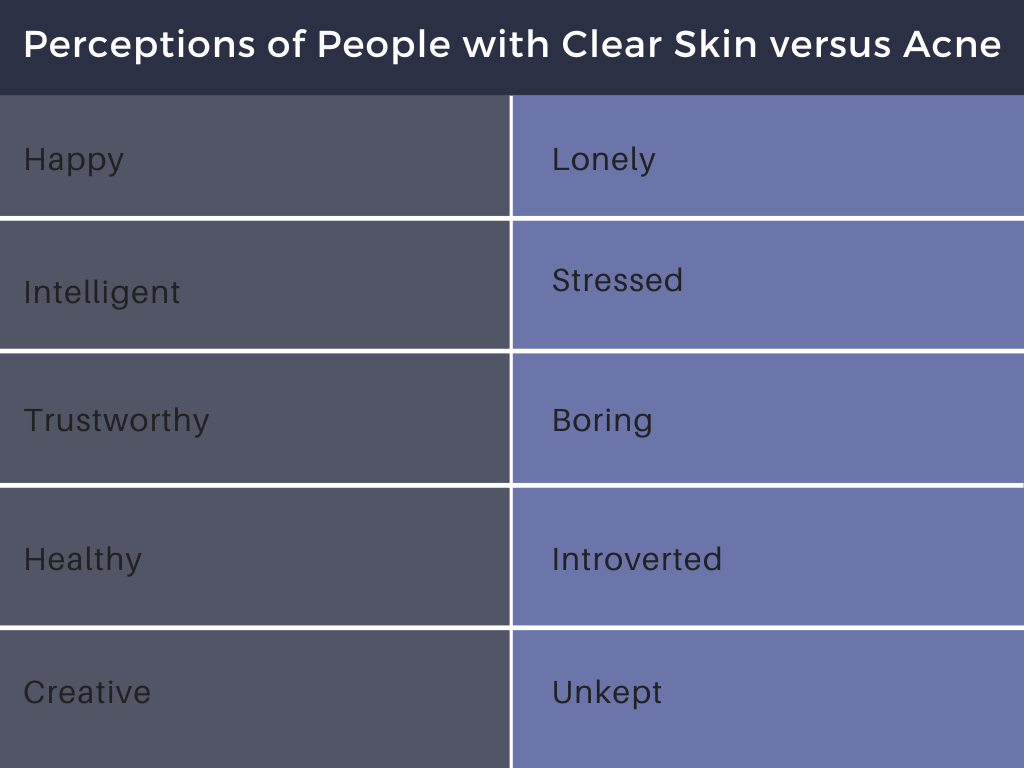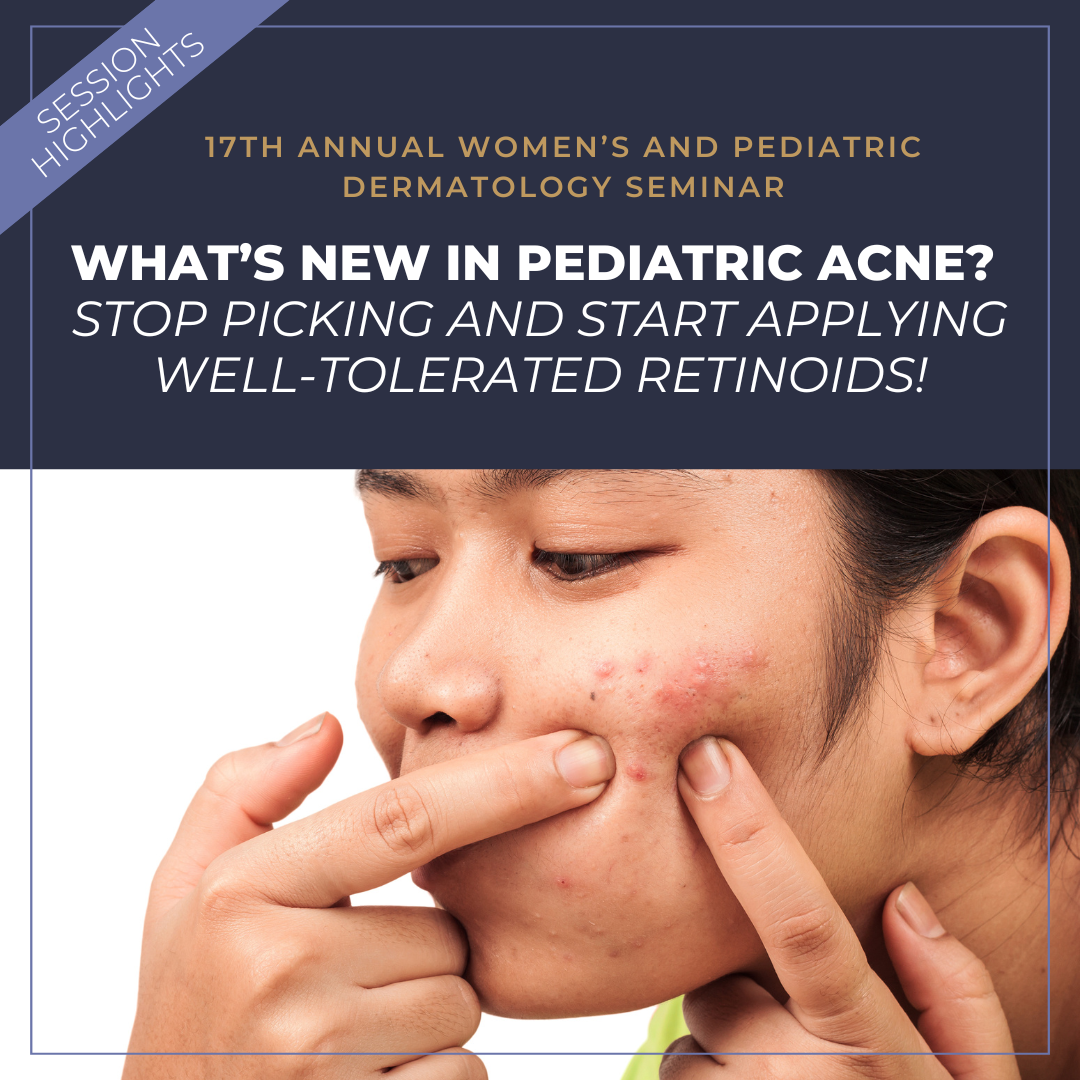Linda Stein Gold, Director of Dermatology Clinical Research at Henry Ford Health System, lead us through “Acne across the ages” at the 17th Annual Women’s and Pediatric Dermatology Seminar. She busted through several acne myths, which are easily debunked with new acne medications:
Clascoterone 1% cream: it reduces sebum production in the skin! Similar to spironolactone, it is an anti-androgen drug which reduces open and closed comedones, papules and pustules.
Tretinoin lotion 0.05%: a well-tolerated topical tretinoin (more than other formulations)
Tazarotene lotion 0.045%: a formulation that is better tolerated than traditional tazarotene formulations, but is just as strong as the 0.1% cream.
Trifarotene cream 0.005%: a retinoid that targets the RAR-gamma receptor, which treats both facial and truncal acne.
0.1% micro-encapsulated tretinoin + 3% micro encapsulated benzoyl peroxide: a formulation that actually allows us to use tretinoin and benzoyl peroxide at the same time!
Read on to find more details about the above medications AND a surprise bonus acne treatment at the end!
I. Acne Severely Impacts Quality of Life
Dr. Stein Gold blew us away with several statistics:
-
- Acne can go beyond teenage years:
About half of women in their 20s have acne, one third of women in their 30s, and a quarter of women in their 40s still have acne
-
- Acne may be more severe in adults than in teens!
- Acne is associated with low self-esteem, and feelings of a poor self-image.
Survey studies have demonstrated that some people with acne feel as if they are not receiving promotions, making friends, or advancing appropriately due to their acne.
When viewing photographs of people with acne, adults and teens perceived those with clear skin as “happy” and those with acne as “lonely”. See some more astounding comparisons in people’s perception of clear vs acne skin.
 http://bmctoday.net/modernaesthetics/2013/06/article.asp?f=targeting-adult-female-acne
http://bmctoday.net/modernaesthetics/2013/06/article.asp?f=targeting-adult-female-acne
II. Clascoterone 1% Cream Reduces Sebum Production in the Skin
MYTH: moisturizers and cleansers can reduce oil production in the skin
FACT: clascoterone 1% cream actually reduces sebum production in the skin.
Contrary to common belief, retinoids and cleansers may normalize follicular hyperproliferation, reduce inflammation, but don’t reduce sebum production.
Clascoterone 1% is the first topical androgen receptor inhibitor for the treatment of acne in 12 years of age and older. It is similar structurally to spironolactone. It was studied all the way down to age 9 for moderate to severe acne, twice a day for 12 weeks. In these studies, up to 20% of patients became clear or almost clear. It demonstrates efficacy by inhibiting sebum production, reducing secretion of inflammatory cytokines, and inhibiting inflammatory pathways. Fortunately, it reduces open and closed comedones as well as papules and pustules, and is well-tolerated.
III. What is New with Topical Retinoids?
The below topical retinoids are approved for acne vulgaris in patients 9 years of age and older!
FACT: tretinoin is labile and is inactivated by benzoyl peroxide as well as light (UVA as well as visible light).
What’s new? we can get around this using a silicone-encapsulated drug delivery system:
A fixed combination cream, 0.1% micro-encapsulated tretinoin + 3% micro encapsulated benzoyl peroxide, features drugs wrapped in a silicone shell. This formulation stabilizes the drug, separates the medications so that they do not touch or interact, and allows for slow, controlled delivery of the medications to the skin. It also makes it better tolerated. Wow! What a powerful new drug. Fortunately, this medication is approved for acne vulgaris in ages 9 and up. In those using this medication for 12 weeks as monotherapy, 38% were clear or almost clear.
FACT: tretinoin 0.05% lotion is specially formulated to increase tolerability.
Tretinoin 0.05% lotion is the most well-tolerated topical tretinoin compared to other formulations (microsphere, gel, and cream). It had better or similar incidence of skin burning, irritation, erythema, and dryness.
This medication is approved for treatment of acne vulgaris in individuals 9 years of age and older.
FACT: tazarotene 0.045% lotion uses an enhanced vehicle, with better tolerability but same efficacy as 0.1% tazarotene cream.
This medication is approved for treatment of acne vulgaris in individuals 9 years of age and older.
FACT: Trifarotene 0.005% cream is specific to the RAR-γ receptor and is beneficial for both facial and truncal acne.
This medication is approved for treatment of acne vulgaris in individuals 9 years of age and older.
IV. Any Natural Treatments for Acne?
The “acne sponge”: think of a mud facial taken to the next level!
Spongilla lacustris is a freshwater sponge species which is under development to treat acne and rosacea. It has anti-microbial and anti-inflammatory properties. The sponge is formulated into a powder containing specifically shaped and sized silica spicules, which help to exfoliate the skin create microchannels to allow for increased effect. To use this sponge, you mix the powder with hydrogen peroxide and apply it to the face once a week, let it sit for 10-15 minutes then rinse. In addition to the potential ant-acne benefits of this mask, it is only necessary to apply once week, which can do wonders for patient satisfaction and compliance.
Parting words…
Dr. Stein gold shared with us one of her mottos about acne (and, well frankly, dermatology):
“Facts of today may become fiction of tomorrow”
We continue to create new and improved acne medications, with smarter and more tolerable formulations. As these come to the market, we can even safely use them in the pediatric population.
Consider these topical treatments, approved for acne vulgaris in our pediatric population:
Clascoterone 1% cream: approved 12yo and up, applied twice daily
Tretinoin 0.05% lotion: approved 9yo and up, applied daily
Tazarotene 0.045% lotion: approved 9yo and up, applied daily
Trifarotene 0.005% cream: approved 9yo and up, applied daily
A fixed combination cream, 0.1% microencapsulated tretinoin + 3% microencapsulated benzoyl peroxide: approved 9yo and up, applied daily
References:
http://bmctoday.net/modernaesthetics/2013/06/article.asp?f=targeting-adult-female-acne
https://www.dermatarx.com/new-index
This information was presented by Dr. Linda Stein Gold at the 17th Annual Women’s and Pediatric Dermatology Seminar held June 3-4, 2022. The above highlights from her lecture were written and compiled by Dr. Jacqueline McKesey.
Did you enjoy this article? Find more on pediatric dermatology here.

